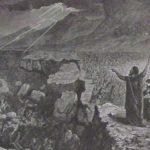We run our website the way we wished the whole internet worked: we provide high quality original content with no ads. We are funded solely by your direct support. Please consider supporting this project.
Podcast: Doesn’t Claiming that the Old Testament Writers were Sometimes Wrong Inevitably Lead to a Slippery Slope?
Greg talks about cataphatic prayer and the role of the imagination.

Send Questions To:
Dan: @thatdankent
Email: askgregboyd@gmail.com
Twitter: @reKnewOrg
Greg’s new book: Inspired Imperfection
Dan’s new book: Confident Humility
Subscribe:
Category: ReKnew Podcast
Tags: Crucifixion of the Warrior God, Cruciform Theology, Hermeneutics, OT Violence, Old Testament
Related Reading

Podcast: How Does the Story of Achan In Joshua 7 Point to the Cross?
Greg looks at a violent Old Testament story through a Cruciform lens. http://traffic.libsyn.com/askgregboyd/Episode_0447.mp3

Podcast: How Can We Say God Accommodates Biblical Writers When They Were ‘Carried Along by the Spirit’?
What does it mean for a Biblical author to be ‘carried along by the Spirit’? Greg discusses 2 Peter 1:20-21. http://traffic.libsyn.com/askgregboyd/Episode_0194.mp3

Podcast: Crucifixion of the Warrior God—The MennoNerds Interview
Paul Walker begins his interview with Greg about Crucifixion of the Warrior God. Paul Walker can be found at MennoNerds. Follow MennoNerds on Twitter. PART ONE: http://traffic.libsyn.com/askgregboyd/Episode_0131.mp3 PART TWO: http://traffic.libsyn.com/askgregboyd/Episode_0132.mp3 PART THREE: http://traffic.libsyn.com/askgregboyd/Episode_0133.mp3 PART FOUR: http://traffic.libsyn.com/askgregboyd/Episode_0134.mp3 PART FIVE: http://traffic.libsyn.com/askgregboyd/Episode_0135.mp3 PART SIX: http://traffic.libsyn.com/askgregboyd/Episode_0136.mp3 PART SEVEN: http://traffic.libsyn.com/askgregboyd/Episode_0137.mp3 PART EIGHT: http://traffic.libsyn.com/askgregboyd/Episode_0138.mp3 PART NINE: http://traffic.libsyn.com/askgregboyd/Episode_0139.mp3 PART TEN: http://traffic.libsyn.com/askgregboyd/Episode_0140.mp3 PART…

Four Principles of the Cruciform Thesis
In the second volume of Crucifixion of the Warrior God, I introduce how four dimensions of the revelation of God on the cross (as introduced in this post) lead to four principles that show us how to unlock aspects of the OT’s violent divine portraits and thus disclose how a given portrait bears witness to…

Podcast: Why Does Peter Say Lot Was a Righteous Man?
Greg ponders the moral judgements of Lot by Peter in light of Lot’s treatment of his daughters. http://traffic.libsyn.com/askgregboyd/Episode_0302.mp3

A Cruciform Magic Eye
In this post I’d like to share the story of how I came upon the thesis I’m defending in the book I’ve been working on for the last four years entitled The Crucifixion of the Warrior God: A Cruciform Theological Interpretation of the Old Testament’s Violent Divine Portraits. It’s a much longer post than usual,…



